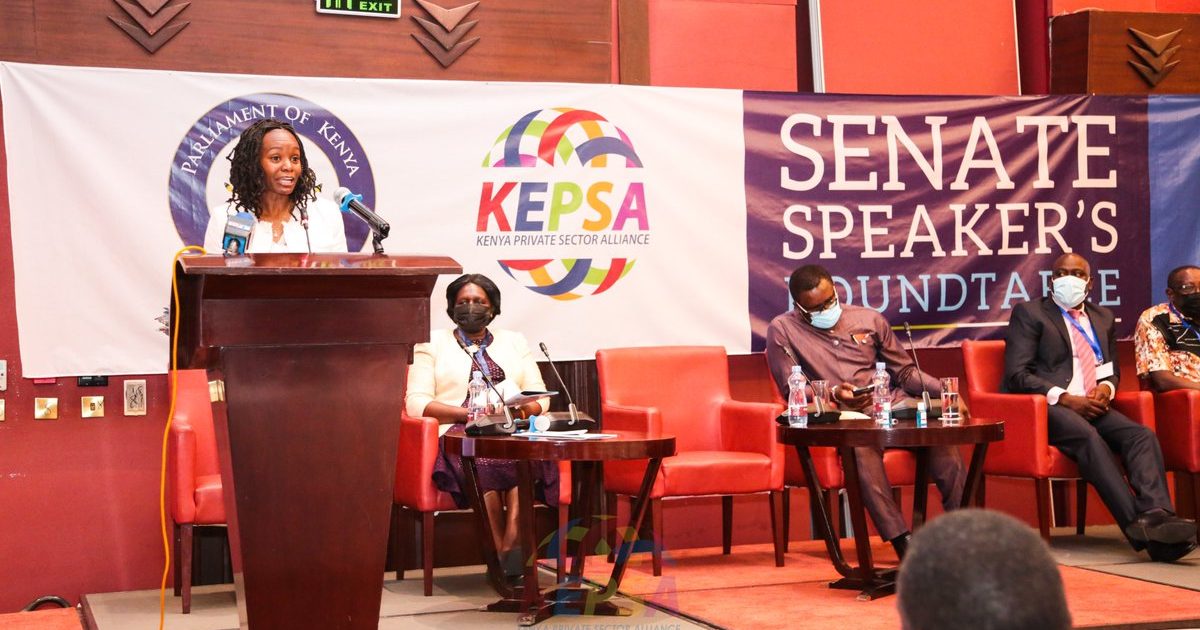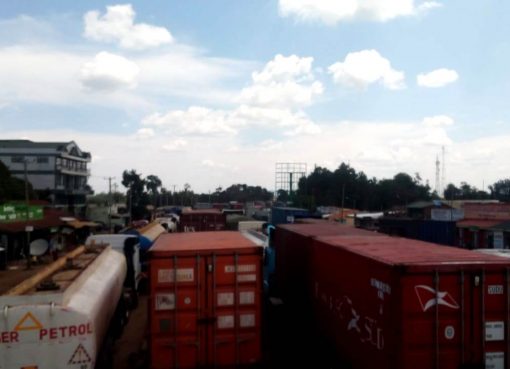The Kenya Private Sector Alliance (KEPSA) held its sixth Senate Speakers’ Roundtable meeting in Naivasha where the business community and the Senate took stock of the achievements over the past four years.
Themed ‘Strategies and Opportunities in Building a Better Future Together’, the round table reviewed progress on ongoing proposed reforms to support trade, investment attraction, and value chain development at the counties as well as the challenges and priority legislative interventions needed to accelerate the country’s economic recovery.
Speaking at the event attended by over 100 participants, KEPSA Chief Executive Officer (CEO), Carole Kariuki, said the Covid-19 pandemic brought new challenges as well as opportunities to re-engineer Kenyan businesses and the sector’s focus shifted to supporting these businesses to overcome the negative effects of the pandemic or turn the dice in their favour.
She added that KEPSA mobilized its members who made a significant impact such as financial contributions to the tune of close to Sh3 billion.
“The government has adopted several private sector proposals, underpinned by the KEPSA Economic Management Framework for Covid-19 Response, and extended support to the private sector to cushion businesses, re-energize the economy, and protect jobs,” the CEO noted.
Kariuki stated that the government’s ten months-long economic stimulus measures that started in April 2020, include reduction of Value Added Tax (VAT) from 16 to 14 percent, Corporation Tax from 30 to 25 percent, Pay As You Earn (PAYE) from 30 to 25 percent with 100 percent waiver for those earning less than 24,000, reduction of Turn-Over Tax from 3 to 1 percent, expedited payment of pending bills and VAT refunds, reduction of Central Bank Rate (CBR) from 8.25 to 7 percent, and Cash Reserve Ratio from 5.25 to 4.25 percent to ease liquidity.
Further, she lauded the government for allocating Sh56.6 billion budget for different sectors under the President’s Eight-Point Economic Stimulus Programme which triggered the phased re-opening of the economy from July 2020 including, among others, the resumption of domestic and international flights and reopening of schools.
She noted that this year’s event follows on the 2019 roundtable which resolved to move beyond enactment of Bills into Laws, but to also ensure that the enacted laws enhance competitiveness and translate to jobs while promoting a green economy among other priorities.
“Key resolutions of the 2019 roundtable include the need to review and analyse the rising cost of doing business in and across the counties, as well as consolidation of other indices in other sectors for a holistic review of the progress of reforms being undertaken in the country,” she reiterated.
Kariuki pointed out that some of the most significant achievements realized over the past two years include the introduction of Bills in the Senate, such as the enactment of the County Outdoor Advertising Control Act, which has advanced the ease of doing business.
She observed that with advertising being a key revenue stream for counties, the Act ensures there is a balance between commercial, environmental, and public safety considerations.
“Over the period, KEPSA has pushed or participated in the development and introduction of eleven Bills in the Senate including The Start-up Bill 2020 which provides for a framework that promotes the culture of innovative thinking and entrepreneurship,” she emphasized.
She added that The Sectional Properties Act which makes it possible for owners of sectional properties to use their properties as security for financing, The Prompt Payment Bill 2020, which provides for the prompt payments of invoices for goods and services procured by public entities within thirty days of submission of an invoice, and The Investment Promotion (Amendment) Bill 2020 which seeks to amend the Investment Promotion Act to ensure county governments participate in the promotion of trade in the country make up the other Bills.
She stressed that The County Licensing (Uniform Procedures) Bill 2020 which has since been passed will ensure quantification of levies, enhance accountability, eliminate competition among counties, and introduce a single national business license which will ensure equitable sharing of collected resources among counties.
The CEO remarked that the participants shared proposals to promote economic recovery through county-level Public-Private Partnerships (PPPs) especially in service delivery and that the priority items in this year’s roundtable include how to spur economy recovery from the riveting effects of the Covid-19 pandemic such as the closure of businesses and staff layoffs due to the precipitated unfavourable business environment in the country.
“Considering the centrality of the PPPs to the success of the Big Four, we are elated by the passage of the Public Private Partnerships Bill (National Assembly Bills No. 6 of 2021) and its referral back to the National Assembly,” she expressed.
In his own remarks, the Speaker of The Senate, Kenneth Lusaka, said business growth in the post-Covid-19 recovery era would depend on the rate of economic and sectoral transformation, linked to the development processes and structural transformation.
“From the onset of the pandemic, most women and youth are now self-employed; for instance, women cooking from home, having buyers order online and having motorbike riders deliver food in offices. Our nation’s challenges in the post Covid-19 era loom large, so restoring livelihoods and growing incomes is a key element of the ‘Build Back Better’ agenda,” he said.
This was the 3rd series of Senate Speaker Roundtables under the 12th Parliamentary cycle directed at setting a legislative intervention agenda between KEPSA and the Senate which is aimed at boosting economic competitiveness for growth and job creation before the next General Election.
By Michael Omondi




